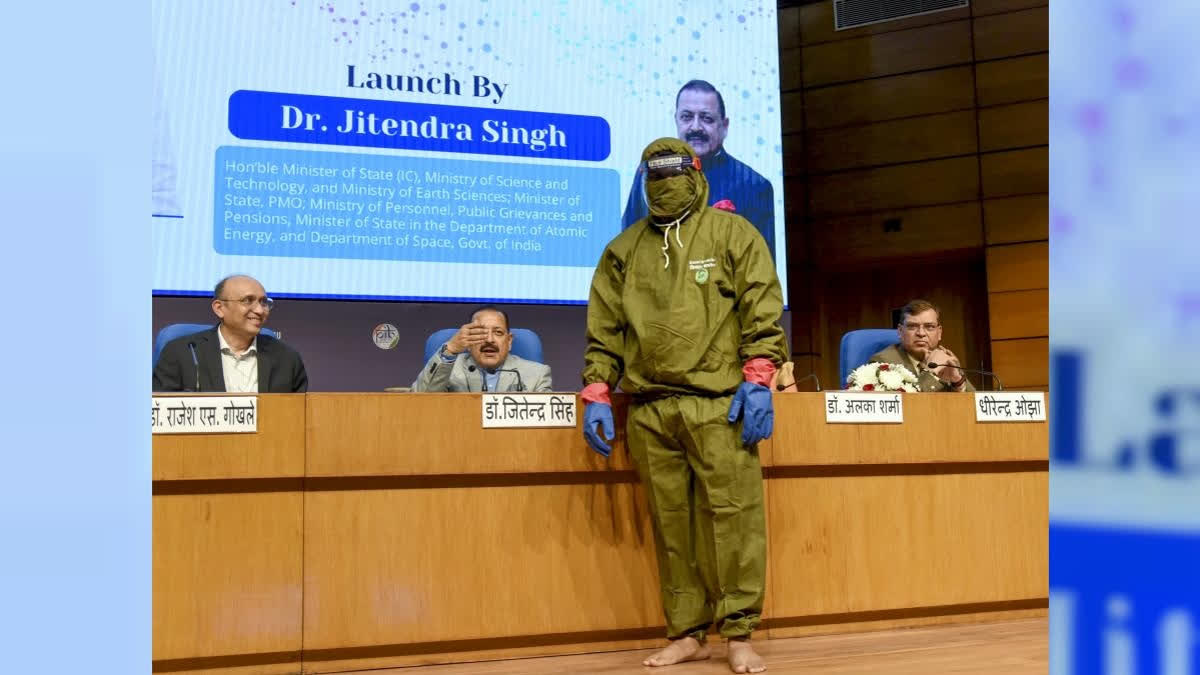New Delhi: Scientists from the Department of Biotechnology (DBT) have developed the Kisan Kavach, an anti-pesticide suit aimed at safeguarding farmers from harmful pesticide exposure. This groundbreaking innovation uses oxime fabric to neutralise pesticides on contact, preventing severe health complications and long-term illnesses caused by exposure.
The suit, developed by Prof. Praveen Kumar Vemula and his team at the Institute for Stem Cell Science and Regenerative Medicine (inStem), Bengaluru, addresses a critical gap in the protection of farm workers, often exposed to toxic pesticides during spraying operations.
Protecting Farmers, Protecting Families
Speaking to ETV Bharat, Prof. Vemula said, "I hail from a village in Telangana where I have seen farmers suffering from acute pesticide exposure firsthand. Our field visits to 60 villages and interactions with over 200 farmers revealed the urgent need for effective protection. These encounters inspired us to dedicate our research to developing the Kisan Kavach."
The suit comprises a trouser, pullover, and face-cover made from oxime fabric, which chemically breaks down pesticides into non-toxic compounds. It provides an affordable and scalable solution to the problem, ensuring farmers are shielded from both immediate and long-term effects of pesticide exposure.
"Protecting one farmer means protecting an entire family and their future generations. Our mission is to ensure no farmer suffers from pesticide-induced toxicity,” added Prof. Vemula.
The Health Impact of Pesticide Exposure
Pesticides are designed to disrupt the enzyme acetylcholinesterase, which plays a critical role in the nervous and muscular systems. Exposure can cause acute symptoms such as dizziness, muscle spasms, breathing difficulties, and even death in high doses. Chronic exposure is linked to long-term illnesses, including cancer.
Prof. Vemula explained, “When farmers spray pesticides without protection, they often suffer side effects like headaches, fever, and breathing disorders that last for days. With Kisan Kavach, they report no such symptoms."
According to a 2022 report by the Food and Agriculture Organization (FAO), India used over 61,000 tonnes of pesticides in 2020. Farmers often spray pesticides without adequate protection, exposing themselves to a toxic environment akin to a "cloud of poisonous rain."
Combining Science and Comfort
Farmers often avoid traditional protective gear due to discomfort and heat. The Kisan Kavach overcomes this challenge by integrating oxime compounds into cotton-based fabric, ensuring both comfort and protection.
At a press conference, Prof. Vemula shared findings from field tests: “Farmers using the Kisan Kavach no longer experience side effects after spraying pesticides. They have embraced it wholeheartedly, with many saying they wouldn’t spray without it again.”
Laboratory tests on rodents demonstrated the fabric’s efficacy, showing that animals covered in ordinary cloth died within days of pesticide exposure, while those using oxime-treated fabric remained unharmed.
Scaling Up Production and Reducing Costs
The Kisan Kavach kit is priced at Rs 4,000, but Prof. Vemula emphasised efforts to make it more affordable. "We have already set up pilot and large-scale manufacturing facilities to meet demand. We are also offering discounts to farmers to promote its adoption," he said.
To ensure broader reach, the team is engaging with the government, corporates, and pesticide manufacturers for distribution under Corporate Social Responsibility (CSR) initiatives. Prof. Vemula stressed, “With government support, the societal impact of this technology can be enormous.”
Union Minister for Science and Technology, Jitendra Singh, present at the event on Tuesday, highlighted the need for awareness and cost reduction. “Farmers must be made aware of this innovation. It is critical to protect their health. Efforts will be made to lower the cost and encourage widespread adoption,” he said while distributing kits to farmers at the press conference.
Singh also emphasised the importance of promoting research and innovation in agricultural safety, saying, “The Kisan Kavach exemplifies how science can directly improve lives and safeguard livelihoods.”
Towards a Safer Future
Prof. Vemula and his team are not stopping with the Kisan Kavach. The next phase of their research involves developing antidote drugs for pesticide poisoning, addressing the lack of effective treatments currently available. The technology has been published in the journal Nature Communications, and the Kisan Kavach retains its efficacy even after 150 washes and under extreme conditions, including high temperatures and UV exposure.
The Broader Context of Pesticide Usage
India’s agricultural sector relies heavily on pesticides, producing about 2,58,130 tonnes in 2022-2023, nearly four times its domestic consumption. With over 104 pesticides manufactured in the country, protecting farm workers from exposure is a pressing need. According to government data, the use of pesticides in India has doubled since 1998. Yet, awareness and access to protective gear remain limited, leaving millions of farmers vulnerable to health risks.
“Protecting farmers is not just about saving lives but also about securing the future of our agriculture-dependent economy,” said Prof. Vemula.



